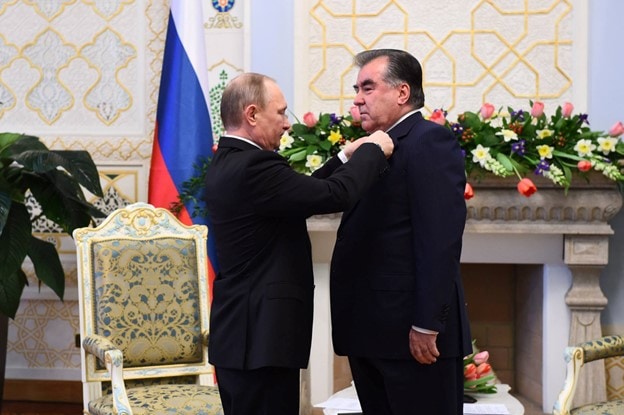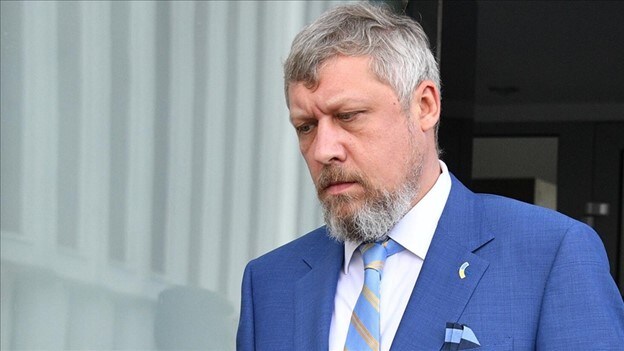On October 9, 2022, Kyrgyzstan abruptly and unilaterally cancelled six-nation military exercises comprising members of the Russia-led Collective Security Treaty Organization (CSTO), less than a day before they were set to start.
The Kyrgyz defense ministry did not provide a reason for the sudden cancellation of the "Indestructible Brotherhood-2022" command and staff exercises.[1] This was the latest symptom of Russia's weakened position in the Central Asian states that formerly comprised part of the Soviet Union.
According to Kommersant's foreign affairs correspondent Maxim Yusin, Moscow is reluctant to press the issue with its erstwhile allies due to its isolation over Ukraine. The Central Asian countries provide a window to the world and help Russia bypass the sanctions by establishing parallel imports.
Yusin's assessment follows below:[2]

Putin awards Tajikistan's President Emomali Rahmon the "Russian Order of Merit For the Fatherland (Source: Asiaplustj.info)
SUPPORT OUR WORK

For Moscow, the week's main international event will be President Vladimir Putin's participation in three summits scheduled in the capital of Kazakhstan, including a meeting of CIS [Congress of Independent States] leaders. Preparations for these activities are taking place against an alarming background. It is from the near abroad that several troublesome news items for the Kremlin have arrived in recent days. The most unexpected was the cancellation by Kyrgyzstan (right at the last moment) of the CSTO [Collective Security Treaty Organization] command and staff exercises, which were to be held in the country.
Bishkek did not supply any explanations, and this decision clearly looks like a demarche. Why did President Sadyr Japarov decide to employ it? And besides, he [Japarov] did not fly to St. Petersburg to celebrate Vladimir Putin's 70th birthday? According to one version, this is how Bishkek, Moscow's CSTO ally, showed its dissatisfaction with the Kremlin's position during the recent Kyrgyz-Tajik border conflict.
Bishkek is convinced that Dushanbe was both its initiator and arsonist. And they painfully perceive the fact that Moscow has not condemned the Tajik authorities, with even half a hint. On the contrary, President Emomali Rahmon received the Russian Order of Merit for the Fatherland, third class, including for "ensuring regional stability and security." This wording aroused numerous questions in Bishkek. According to the second version, the exercises were canceled as a result of Western pressure.
The Americans and Europeans have found a way to influence President Zhaparov, to convince him to distance himself from Moscow amid the problems that Russia is experiencing in Ukraine.
Be that as it may, during the talks announced in Astana between Vladimir Putin and his Kyrgyz counterpart, the two leaders face a difficult conversation. Not everything is cloudless today in Russia's relations with the summit's host - Kazakhstan. A bitter aftertaste was left by the scandal with the Ambassador of Ukraine in Astana, Petro Vrublevsky, who in one of his interviews called for "killing as many Russians as possible."
Following that, the Kazakhstan authorities made it clear to Kyiv that Vrublevsky's further stay in the country was undesirable, and they [the Ukrainians] began looking for a replacement to the ambassador. Vrublevsky left Astana for some time, but then returned and was even seen at official events. This provided the Russian Foreign Ministry with a pretext to declare that "the development of the situation around Vrublevsky causes indignation." In Astana, they took these words badly.

Ukrainian ambassador to Kazakhstan Petro Vrublevsky (Source: Aa.com.tr)
The Russian ambassador was summoned to the Foreign Ministry, and Foreign Ministry spokesman Aibek Smadiyarov lamented that the tone of Moscow's statements "is discordant with the nature of allied relations between Russia and Kazakhstan as equal partners." A public clarification of relations with Astana looks especially untimely in the current international situation, when Moscow already has so few allies, and the CIS countries (and especially Kazakhstan) remain among the few windows to the outside world that enable parallel imports to be established and, if possible, to bypass Western sanctions.
However, the post-Soviet states are in no hurry to come to the rescue. In many cases, they fear secondary sanctions from the West. The most striking example is the refusal of many The most striking example is the refusal of many CIS countries' banks to service Mir [credit] cards. In general, the near abroad, where until recently Moscow's positions seemed indestructible, is turning into Russia's Achilles' heel before our very eyes.




